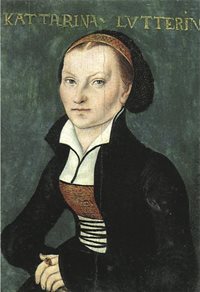 On 13th June 1525, the day Martin Luther had proposed, the former nun married the former monk. The newly-married couple moved into what had been his former monastery, the Black Cloister. There were some significant adjustments to be made. Luther wrote to a friend about his surprise upon waking in the morning to see “a couple of pigtails on the pillow.”
On 13th June 1525, the day Martin Luther had proposed, the former nun married the former monk. The newly-married couple moved into what had been his former monastery, the Black Cloister. There were some significant adjustments to be made. Luther wrote to a friend about his surprise upon waking in the morning to see “a couple of pigtails on the pillow.”
Their home was a hive of activity and became something like a Reformation study centre that attracted people from all over Europe – often with 30 or 40 students in residence. Luther called his wife “the Morning Star of Wittenberg” because she rose before dawn to begin her industry in their vegetable garden, orchard, farm, vineyard and brewery. She was shrewd in handling the finances and succeeded in controlling Luther’s spending.
Mutual and abiding love
Their letters reveal a mutual and abiding love between Martin and his “dear Käthe”. It became a marriage of genuine affection and admiration and, according to one scholar, she was “above all, a spiritual companion” – encouraging him in his ministry.
This marriage was not without its difficulties. They lost two of their children – Elisabeth as a baby and Magdalene as a teenager. In such dark days they encouraged one another with words of Scripture and truths from their catechism. Martin did not enjoy good health, suffering from kidney stones, asthma, bowel problems, insomnia and ear infections.
As her husband’s health deteriorated, Katharina urged him not to travel as much. In the winter of 1546, whilst engaged in the wider work of the Reformation in his hometown of Eisleben, Luther died. His beloved Katie was unable to be at his bedside.
Deep sorrow
After his death she wrote, “My sorrow is so deep that no words can express my heartbreak, and it is humanly impossible to understand what state of mind and spirit I am in...I can neither eat nor drink, not even sleep... God knows that when I think of having lost him, I can neither talk nor write in all my suffering.”
Life afterwards for her and the children was hard, compounded by war and plague. Four years later Katharina was seriously injured in an accident and died on 20th December 1550. Her final words gave voice to her faith, “I will stick to Christ as a burr to a top coat.”
This marriage between a former monk and a runaway nun helped change the way that many Christians thought about not only marriage, but also the nature of Christian discipleship.
Furthermore, singleness and celibacy were often viewed as ways of reaching a higher state of spirituality. With the Reformation, marriage was restored to a place of honour and respect; it was a vocation to be prioritised.
Similarly, the home became a school of Christian discipleship and a sphere for growth in godliness for husband, wife and children. In this remarkable transformation of ethics, Katharina stands alongside her husband as a mother of the Reformation.
 Rev. Dr. Martyn Cowan is Lecturer in Historical Theology at Union Theological College, Belfast.
Rev. Dr. Martyn Cowan is Lecturer in Historical Theology at Union Theological College, Belfast.
You can read part 1 of Dr. Cowan’s A Reformation woman here. You can also read A brief guide to Luther (part 1 and part 2) by Professor Laurence Kirkpatrick, as part of this series on the Reformation.
Faith at the crossroads is a special celebration of the 500th anniversary of the Reformation. There will be three opportunities to share in this free celebratory event – 17th October in Dublin, 18th October in Londonderry and 19th October in Belfast.